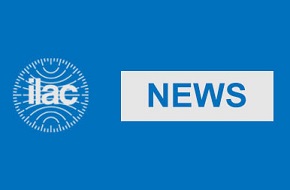
Posted on behalf of Eurolab
We are excited to invite you to our upcoming webinar on Guidelines for the Management of Digitalised Systems in Laboratories Accredited to ISO/IEC 17025, scheduled on 27 November 2024, from 10:00 to 12:00 CET. This session will explore EUROLAB’s new Technical Report, offering insights on managing digitalised processes in ISO/IEC 17025-compliant laboratories.
Webinar Highlights
You can register for the event here: Event Registration Page.
Registration fee: 70 € (all ticketing fees included).
Don’t miss this unique opportunity to enhance your knowledge and apply the latest digital management guidelines in your laboratory!

The International Accreditation Forum (IAF) and International Laboratory Accreditation Cooperation (ILAC) have begun the process of incorporating the Global Accreditation Cooperation, a single international organization for accreditation. The target date for the Global Accreditation Cooperation to become operational, taking over the roles of IAF and ILAC, is provisionally January 2026.
To provide regulators, specifiers and other stakeholders with information on the transition to the Global Accreditation Cooperation, IAF and ILAC have released a communication Download on specifying the use of Global Accreditation Cooperation accreditation. The communication addresses the transition from the IAF Multilateral Recognition Arrangement (MLA) and ILAC Mutual Recognition Arrangement (MRA) to the Global Accreditation Cooperation MRA, the use of the IAF MLA and ILAC MRA marks, and other related issues. Until the target date and establishment of the internal processes and procedures of the Global Accreditation Cooperation, IAF and ILAC will maintain normal operations.
IAF and ILAC are encouraging our members, regulatory bodies, scheme owners and other stakeholders to collaborate on making any necessary changes to regulations and specifications as soon as possible after the target date. This will aid in a smooth transition to the Global Accreditation Cooperation, which is positioned to improve the acceptance and recognition of accredited conformity assessment results across borders.

The signatory status of Swiss Accreditation Service (SAS), Switzerland, to the ILAC MRA has been extended to include the accreditation of Proficiency Testing Providers (ISO/IEC 17043) and Reference Materials Producers (ISO 17034).
The full list of signatories to the ILAC MRA is available from https://ilac.org/signatory-search/ .

The signatory status of Organismo Salvadoreno de Acreditacion (OSA), El Salvador, to the ILAC MRA has been extended to include the accreditation of Medical Testing (ISO 15189).
The full list of signatories to the ILAC MRA is available from https://ilac.org/signatory-search/ .

The signatory status of Jamaica National Agency for Accreditation Global Accreditation (JANAAC), Jamaica, to the ILAC MRA has been extended to include the accreditation of Calibration (ISO/IEC 17025).
The full list of signatories to the ILAC MRA is available from https://ilac.org/signatory-search/ .

The signatory status of Sri Lanka Accreditation Board for Conformity Assessment (SLAB), Sri Lanka, to the ILAC MRA has been extended to include the accreditation of Proficiency Testing Providers (ISO/IEC 17043).
The full list of signatories to the ILAC MRA is available from https://ilac.org/signatory-search/ .

Posted on behalf of EUROLAB
Dear EUROLAB Members and Contacts,
We are pleased to announce that registration for our upcoming Webinar on the “Mutual Recognition Agreements on Conformity Assessment and Challenges Faced by Laboratories in the EU and International Export Markets” is now open.
Don’t miss the opportunity to attend the webinar on 2 October 2024, from 10:00-13:30 CET to gain valuable insights into the crucial role of MRAs in global trade and the challenges and opportunities they present for laboratories in the EU and beyond. The discussion will be led by industry experts and policymakers, with a keynote address by Lucian Cernat, Head of Unit at DG Trade, European Commission.
Updates and news regarding the webinar will be posted on the EUROLAB website and LinkedIn page .
Register here by 29 September.

Reproduced on behalf of A2LA.
With great sadness, The American Association for Laboratory Accreditation (A2LA) shares the passing of founding member and first president, John William Locke, at the age of 91. Locke passed away on September 11, 2024, after a brief illness.
John served as A2LA’s first president for 10 years from 1986-1996 and made monumental contributions to the global accreditation industry throughout his long, successful career.
“Without John, A2LA wouldn’t be here today,” said A2LA’s current President and CEO Lonnie Spires.
“Once I began traveling internationally and working with APLAC and ILAC, I saw his fingerprints everywhere on the international accreditation landscape,” said A2LA Vice President of Accreditation Services Trace McInturff. “John’s vision went beyond just establishing a domestic accreditation body that could service all industries in the United States. It included the goal of ‘one accreditation accepted everywhere’—which has been achieved with ILAC today.”
John Locke Award
Since 2006, A2LA has presented an annual award in John’s namesake, the John Locke Award—and is the highest honor presented by the association. The award honors a distinguished recipient for their years of hard work and dedication in accreditation. To achieve this honor, the recipient must achieve six out of seven of the following criteria:
John W. Locke’s Life
John was born in LaSalle, Illinois on January 27, 1933, and grew up on a farm tending to animals. He attended high school and junior college at St. Bede Academy and went on to earn a Bachelor of Science Degree in Aeronautical Engineering from the University of Illinois. In 1955, John married his wife Margaret Kincius, and together, they had six children.
During his career, John worked on Cold War era airplanes and missiles, and later on, worked for various government agencies. He then transitioned to developing standards for the accreditation of laboratories. After John retired from a successful career in the accreditation industry, he studied at seminary and was ordained a Deacon in the Catholic Church.
Honoring John’s Memory
John’s legacy will forever be remembered by A2LA’s leadership, staff, assessors, and even many longtime customers. A2LA’s headquarters, located in Frederick, MD, includes a conference room named in John’s honor, the Locke Conference Room.

Posted on behalf of Stakeholder Member, the European Network of Forensic Science Institutes (ENFSI)
Dear colleagues and valued stakeholders,
We are delighted to extend an invitation to you for our upcoming dissemination event:
“CERTAIN FORS: Innovation in forensic science, setting the standards for the future”
September 23rd – 24th 2024
Frankfurt, Germany
We believe that your presence at this event will greatly contribute to the exchange of knowledge and ideas in the field of forensic science. Your expertise and insights will be invaluable in shaping the discussions and outcomes of the event.
We look forward to welcoming you at the event and to the opportunity to engage with you on this important topic.
The event will commence on September 23rd with a leisurely stroll through the Old Town, followed by dinner. The walk is scheduled to begin at 5 PM, so please ensure to check in at the hotel by 3 PM on September 23rd.
On the following day, after breakfast and check-out, a shuttle service will transport us from the hotel to the event venue. The event will conclude around 5 PM on September 24th. Hotel rooms are booked and prepaid from 23rd to 24th of September. If you need an additional night due to flight/train schedules, you may specify in the registration process.
You can register here
To stay updated on this event and for public transport instructions in Frankfurt, please visit our website
If you have any remaining questions, please do not hesitate to contact us in organizational matters (secretariat@enfsi.eu) or Raimonds Apinis (raimonds.apinis@ekei.ee ) for thematic questions.


We welcome Dirección Técnica de Acreditación del Instituto Boliviano de Metrologia (DTA-IBMETRO), Bolivia, as a Full Member of ILAC.
DTA-IBMETRO joined ILAC as an Associate member on 7 June 2024. As DTA-IBMETRO is a signatory to the IAAC MLA for the accreditation of calibration and testing laboratories using ISO/IEC 17025 and inspection bodies using ISO/IEC 17020, DTA-IBMETRO has also been granted signatory status to the ILAC MRA and therefore, Full membership of ILAC.
We welcome DTA-IBMETRO as a Full Member and look forward to working with our DTA-IBMETRO colleagues.
The full list of signatories to the ILAC MRA is available here.